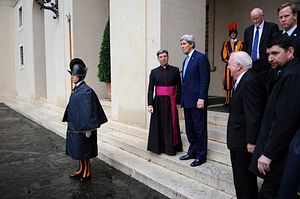I was fairly young at the time of the 9/11 terrorist attacks, but remember the day fairly well, including President Bush’s speech to the American people that night. The part of Bush’s speech that most struck me was when he explained that, “America was targeted for attack because we’re the brightest beacon for freedom and opportunity in the world.” He expanded on this theme in his famous speech to Congress nine days later. Referring to al-Qaeda, Bush stated: “Americans are asking ‘Why do they hate us?’ They hate what they see right here in this chamber: a democratically elected government. Their leaders are self-appointed. They hate our freedoms: our freedom of religion, our freedom of speech, our freedom to vote and assemble and disagree with each other.”
I remember wondering at the time why someone halfway around the world would be so angered by how Americans were living that they orchestrated attacks against the country. Of course, in subsequent years I’d learn that it wasn’t al-Qaeda’s hatred of the Bill of Rights that motivated its heinous acts. Bush nonetheless remained steadfast in his contention that democracy was the only true antidote for terrorism. Besides launching the Iraq War in 2003, Bush based his second term counterterrorism strategy—starting with his inaugural address—on spreading freedom throughout the Middle East. Meanwhile, the pressure against al-Qaeda leaders outside of Iraq seemed to wane.
President Obama has undoubtedly been more successful at counterterrorism, particularly in hunting down al-Qaeda leaders. One of the key reasons for this is that he wisely decided to narrow the scope of America’s counterterror efforts to al-Qaeda itself, in contrast to President Bush who promised his campaign would “not end until every terrorist group of global reach has been found, stopped and defeated.”
Still, even if the Obama administration has proved more effective at killing terrorists, this doesn’t mean it understands the underlying factors that are motivating terrorists’ actions any better than did its predecessor. In fact, some Obama administration officials seem even more confused on the matter than did President Bush. This is certainly true of Secretary of State John Kerry, who said in a speech at the Vatican this week that “we have a huge common interest in dealing with this issue of poverty, which in many cases is the root cause of terrorism.”
As the Weekly Standard points out, this apparently wasn’t an isolated statement from Kerry. In a speech last October following al-Shabaab’s siege of a shopping mall in Nairobi, Kerry opined: “Getting this [counterterrorism] right isn’t just about taking terrorists off the street. It’s about providing more economic opportunities for marginalized youth at risk of recruitment.”
The assertion that poverty is a root cause of terrorism makes good intuitive sense, and is therefore not a particularly new claim. In fact, in many ways it dates back to the anti-colonial period when it was assumed that the insurgents the European powers found themselves fighting were similarly motivated by their poverty. But it is exactly because the issue has received so much attention that Secretary Kerry—given his current and past occupations—should be well aware that the notion that there is a connection between poverty and terrorism has been disproven time and again.
For example, two researchers conducted a systematic assessment of the different possible determinants of terrorism, and concluded “economic development as measured by GDP per capita does not matter for the amount of terrorism.” Two other scholars tested whether poverty motivated individual terrorists in different contexts, and concluded: “neither poverty nor education has a direct, causal impact on politically motivated violence and terrorism.” In fact, they write, “The evidence that we have assembled suggests that having a living standard above the poverty line or a secondary school or higher education is positively associated with participation in Hezbollah. We also find that Israeli Jewish settlers who attacked Palestinians in the West Bank in the early 1980s were overwhelmingly from high-paying occupations.”
Robert Pape profiled Arab suicide bombers between 1980 and 2003 and reached similar conclusions. Namely, that suicide bombers were far better educated than the average person in their societies. 54 percent of the suicide bombers had some post-secondary education, for example, while only a “small fraction” of the populations in their countries could say the same. Moreover, Pape found Arab suicide bombers overwhelmingly came from middle and working class families and were employed, rather than from the bottom rung of society. “The bottom line,” Pape writes “is that suicide attackers are not mainly poor, uneducated, immature religious zealots or social losers. Instead, suicide attackers are normally well-educated workers from both religious and secular backgrounds.” And terrorist leaders themselves are often times from extremely wealthy and prominent families, with Osama bin Laden and Ayman al Zawahiri being two prime examples.
Kerry’s apparent belief that poverty causes terrorism is important not because it shows that many U.S. leaders are unacquainted with the terrorism literature—although frankly, they should have some understanding of it—but rather because it underscores that America still fails to understand terrorism from a conceptual standpoint. Terrorism, by definition, is a political act meant to advance a political cause—however misguided both may be. Poor, uneducated people are not terrorists for the same reason that single mothers working two jobs aren’t normally anti-war activists attending rallies. It is rather well to do, educated people who are most prone to participating in political activities. The more extreme the activities and causes are, the more likely this is to be true.

































